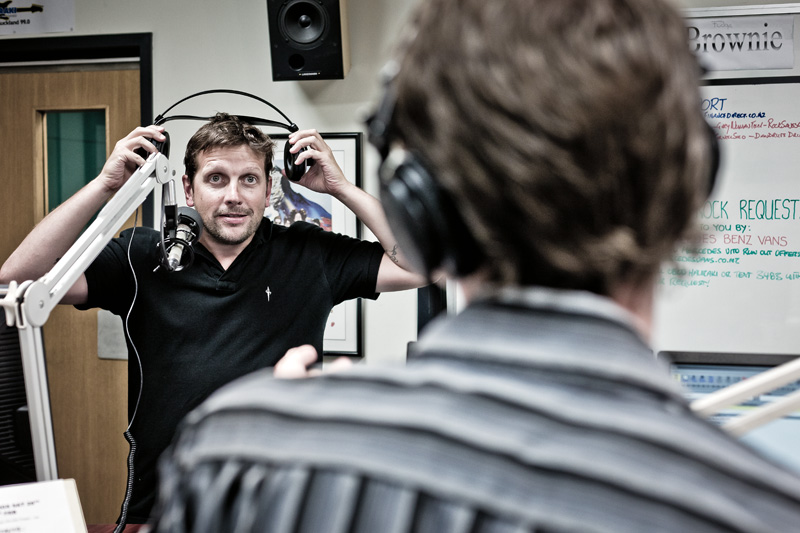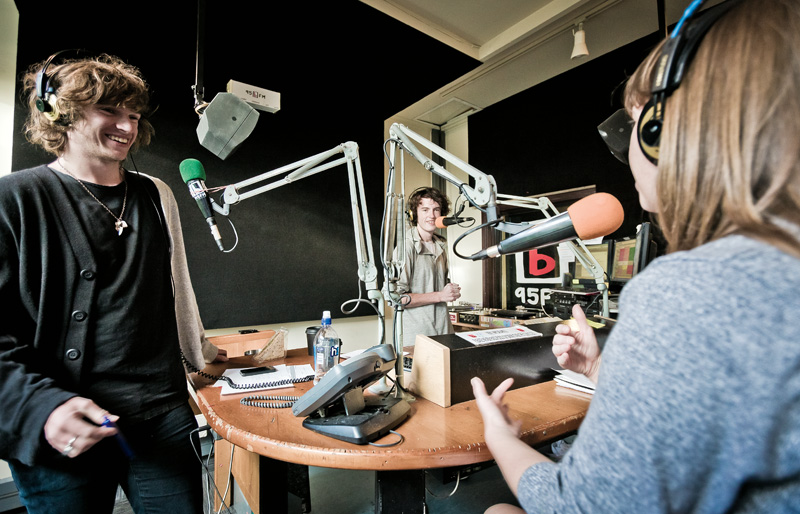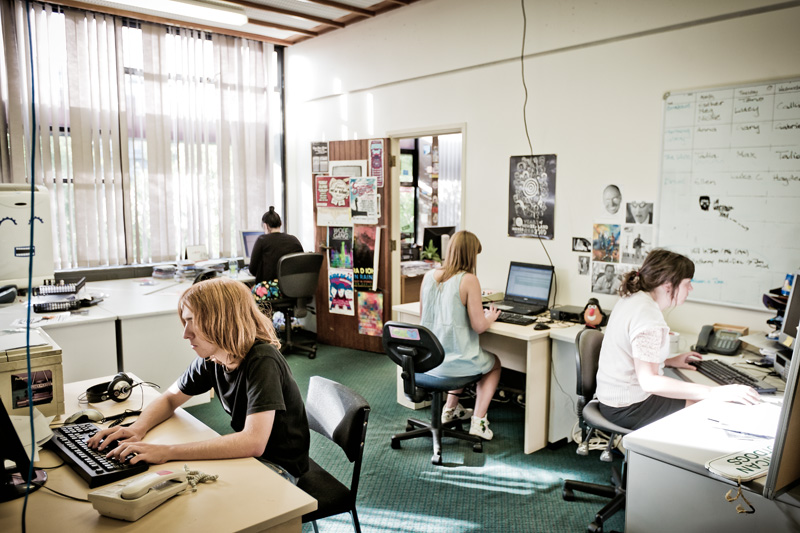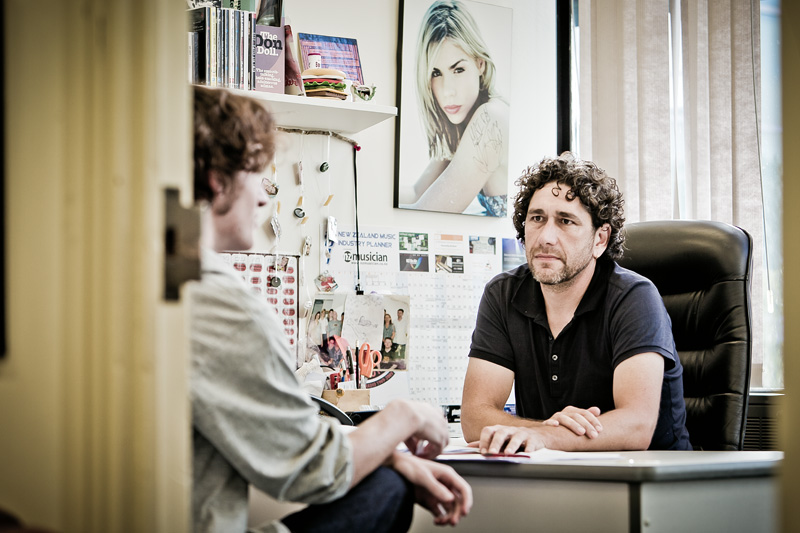May 12, 2014 Music
The last of the famous faces of the nineties has finally left bFM, and now the station has its freshest lineup in over 20 years. But do the youth of today have what it takes to keep the station great?
First published March 2011. Photos: Adrian Malloch.
It’s a typical bFM moment. “Penis, or genius?” ponders host Matt Heath, a cold Steinlager in hand. “I reckon we need to define them first. Who’s a classic penis?” Steve Simpson — the former bFM brand manager and host from whose mind this segment sprang — is momentarily dumbstruck. There’s a pause while those present scour their minds, before long-time Heath collaborator Gerald “The General” Stuart pipes up with the perfectly idiotic, and apt, “Adolf Hitler?”
It’s a typical bFM moment, but we’re not at bFM. This exchange goes down in the vaguely sterile surrounds of a Radio Network studio, with a fourth man — producer and sometime co-host Tim Batt — gamely trying to keep up with the banter while reminding his companions that “the c-bomb is definitely out of bounds — that’s the one you can get fired for”.
It’s February 1, 2011, and Heath is midway through his first Drive show for Hauraki, and so far seems to be fitting in just fine. But although bFM and Hauraki both began life as pirate radio stations, today “Hauraki Amped” (as it’s currently known) is a spoke in the Radio Network’s wheel, alongside Newstalk ZB, Classic Hits and ZM, while bFM remains a varsity radio station, owned by the Auckland University Students’ Association.

Matt Heath, the idiot savant behind the band Deja Voodoo and Back of the Y Masterpiece Television, has been lured away from b to become “New Zealand’s favourite bogan”, according to Hauraki promotions. He’s their new drive-time weapon in a war for ears and advertising dollars with every other commercial FM network in the country. Whether he’s a good fit long-term is an open question — but if any bFM grad has the right tone for commercial “rock” radio it’s Heath, whose un-b love for Sabbath and sports is entirely unaffected.
What is certain is that the departure in quick succession of Heath and Mikey Havoc late last year represents both a risk and opportunity for bFM. The pair were the last prime-time link with the generation that ran the station through the nineties and 00s — many of whom are now making award-winning television and filling key slots across the radio and TV spectrum — and there’s a real risk a big part of the remaining audience will walk with them.
Equally though, the 20-year-olds who have been dumped into Breakfast and Drive, very green and blinking at the light, have a real shot at creating their own legacy.
And their appointment has had one immediate and very handy outcome: it blunts the recent, persistent criticism that some of the old-timers hung around for way too long.
Havoc and Heath both came of age during a period when b was a rogue element in the otherwise soporific Auckland radio market and had grown big enough to unsettle the national players with its radically different music, bug-eyed hosts and BSA-worrying slogan, “Other radio stations are shit.”
Lately, though, has bFM become a little safe? In 2007, DJ Andrew Black was fired after more than two decades on air for ignoring repeated warnings against smoking pot in the studio — something unthinkable a few years before when smoking pot was considered part of being “a proper radio DJ”.
Recently, an email did the media rounds revealing a host had complained to new presenters Rhys Darby and David Farrier that “beer bottles… shouldn’t be near the desk anyways, for obvious spillage reasons”. Most sacrilegiously of all, the board hired a former programme director from Mai FM — commercial radio — to run the whole thing. The hellraisers of days gone by were far from impressed.
“bFM used to be first on the scene — the originator,” says one former host. “But the people who make the decisions at the station nowadays don’t go to gigs, don’t go to parties, they don’t even drink alcohol. It’s all got a bit conservative.”
Maybe there wasn’t a choice. Back in the nineties, when it made its name as the place for any brand wanting a piece of that post-Nirvana “edgy youth market”, bFM could afford to be loose. So what if the host was pin-eyed on speed and turned up an hour late? It didn’t stop Vodafone sponsoring the “b card” — a discount club for the station’s listeners — or the breweries giving them all the beer they could guzzle at DJ meetings and Private Functions.
For a few years, those functions were the best parties going: b card holders turned up en masse to hear the new music, unpaid “vollie” (volunteer) DJs got to get wasted, and ad agency players got to inhale the pheromones. Heath calls them the most dazzlingly debauched gigs of the era. “Before I’d ever set foot in the door I’d be trying to make it into their parties,” he says. “Everyone knew they were the best, and that might have been why I started going up there. So I could get let in.”
The station exploited its competitive advantage to the hilt. It was the only one in town playing hip hop and Flying Nun and grunge — the listeners knew they were onto something and the station knew they knew — the slogan for a minute there was “you lucky little bastards”. They were so cool they were turning down clients other stations would gargle gasoline for.
“bFM had that swagger to it,” says former brand manager Simpson. “We had raging debates about whether to let McDonald’s advertise with us, or Coke. They would come along with what would’ve been a pittance for them, y’know, 10 or 20 grand, but at bFM a lot of the campaigns were around 400 bucks. But all these people were taking a stand against it.”
Someone on the station’s board had the bright idea of entering bFM in the ratings survey in the early 00s, and they shocked everyone — most of all themselves — by registering a very respectable six per cent of the Auckland market. The leader, Newstalk ZB, was pulling only 12 per cent.
But almost from that moment on, b’s influence began to wane. The competition arrived in any number of strange new vehicles: everything from Swedish mp3 blogs to on-demand music services like Spotify moved into the music gateway territory it once owned outright. The outlaw style became commodified and successfully marketed by everyone from MTV’s Jackass to The Edge’s infinitely depressing Morning Madhouse. More problematic still has been the way commercial radio has picked the eyes out of musical elements which used to be bFM’s sole preserve.
“A classic bFM band, like say the Naked and Famous, will get interviewed and played on ZM and The Edge as well,” says Hugh Sundae, Breakfast host in the early 00s. “So you’ve got to get further and further underground to claim that ground again. And then you lose your mass audience.”
The underground where bFM dwelled secretly wasn’t all that deeply buried. It was more that commercial radio wilfully ignored the rumblings from below. No longer: New Zealand music on commercial radio rocketed from two per cent to 20 per cent in less than a decade, while the immensely popular “alternative” bands once heard only on bFM became mainstream. The likes of the Chemical Brothers, the Killers and Metallica all debuted in Auckland on bFM and now play Vector.
To remain different, to still be “bFM”, the station has had to dig a little deeper. Druggy psychedeliacs Of Montreal and twee indie popsters The Pains of Being Pure at Heart are two fine bands in the bFM top 10 as of writing; unfortunately, they aren’t particularly popular.
Meanwhile, with such a long list of “alumni” (as the station cutely refers to its former staff and DJs) there’s no shortage of opinions on what the station should do to return to the glory days. Graeme Hill — the station’s first full-time Breakfast host — shoots back a one-word reply when asked what the station should be to regain its influence and audience: “Dangerous.”

producer Imogen Barrer.
Dangerous was the watchword through the mid-eighties and nineties as, under the influence of station managers like Debbie Gibbs and Jude Anaru, the station morphed from a quirky, AM frequency aberration which had broadcast only during Orientation to a fully staffed, 24/7 FM station while somehow getting more wild.
Gibbs typifies the dedication of her generation: she once slept through an alarm prior to hosting a Breakfast show, and when they called her she leapt on her scooter to ride in wearing a dress but no shoes. She ripped the skin clean off her foot taking a corner too fast, but rather than head to hospital she tramped blood up three flights of stairs and requested first aid over the airwaves.
Similarly, the DJs were not shy about experimenting with intoxicants in pursuit of perfect radio — staff bonding was forged during “group acid”, while another host realised they were finding morning work difficult due to never having done a show sober before. They called an old hand for advice, and he handily suggested cocaine as the socially acceptable alternative to alcohol before noon.
Staff of the time say what drew them to the station was the talent and fevered atmosphere emanating from the studio — many were slowly losing their minds in the suburbs before they found salvation in bFM. They took a deep breath, walked through those heavily stickered doors and requested the complex taste test known as a volunteer form, and became part of the renegade community. And, therefore, subject to its somewhat obtuse mores.
The b team had a particular affection for elaborately staged pranks — one DJ pulled a “dick-in-a-box” stunt a decade before Saturday Night Live and Justin Timberlake immortalised it in song.
Others tended to be more violent, while still retaining their genital focus. One of Hill’s favourites: “The studio was arranged so that from the desk you could only see halfway down the entry door. So while one guy was doing a show, I crawled in when someone else went in to do something and waited under the desk for what seemed like an age for the DJ to do a voice break. I was sitting staring between his legs and I waited until he was halfway through a sentence and I just grabbed his groin. It was just a tremendous yelp on air. And then gales of laughter from people in the office.”
The hazing was not only physical but often verbal. Some have called it bullying, although Hill has his own take on that. “Bullying sounds really, really pointless,” he says. “I’d call it rigour. A lot of us just kept an eye out for appalling taste. There was a regime of rigorous inquiry, for people that were on air, their music taste, stupid attitudes, things like that. It wasn’t bullying, we just didn’t want to put up with shit.”
They felt protective of the station and what it stood for. “We thought of ourselves as custodians, rightly or wrongly.”
Steve Simpson calls working for the station at the time a “noble mission”. He says, “bFM felt like it was the coolest kid in town. There were a lot of big male egos. And big female egos too.”

Is that a hint of an apology — of a consciousness that bFM can be something of a boys’ club? On the face of it, you could argue that’s a ridiculous idea. Over half the station managers have been women and the likes of Gemma Gracewood, Jaquie Brown, Noelle McCarthy and latterly Charlotte Ryan have been integral to its success. But when the station put together its own history — the 95bFM Historical Society broadcasts — just seven of the 40 people interviewed were female. And some former staff told Metro the station has taken an unpleasantly boorish turn of late.
That’s certainly the impression of Adele Hunter-Higgins, until recently b’s traffic manager. If you’re unfamiliar with the title, don’t fret — one of the more Kafka-esque elements of redundancies at the station has been the invention of strange new titles for regulation radio positions.
Hunter-Higgins was at one time a shining star, music director in all but name in her early twenties. Then she was laid off, only 18 months after her appointment, and replaced by a music committee which featured her one-time mentor Troy Ferguson — himself an ex-music director made redundant — in a prominent role.
No one expects b to be a regular workplace, but that doesn’t explain some of the things Hunter-Higgins recalls. “I think that it’s almost comically, stereotypically predatory,” she says. “There are a number of middle-aged men in leading positions, and there are a lot of young women, often volunteers, who seem to be put in positions where they’re at best being objectified, at worst it’s borderline sexual harassment.”
Like what? “These guys would sit uncomfortably close to them, and make very charged comments. And these would be very young people, 18, 19, and the guys would be in their 40s.”
A former receptionist told us about a male staff member “giving volunteers these long hugs — I don’t know if it was unwanted, but it was definitely creepy.”
In the past few years programme director Aroha Harawira and station manager Helen Mobberly have been laid off, and some say it’s part of a pattern. According to one female ex-employee, “The going mentality is, ‘It’s a boys’ club, you’ve got to accept that.’”
It’s notable, however, that Mobberly was replaced by Pennie Blair, who has a key role in the station and is widely respected.
Station manager Manu Taylor says he’s surprised to hear the complaints. He’s in a long-term relationship with former bFM-er Jennifer Weather-Centre, and has cultivated a very uncontroversial image.
He’s firmly of the opinion that such criticisms are “sour grapes” on the part of former employees who did not conform to the station’s needs.
“I believe this exercise has become a witch hunt… [by] those who believe they have been forced out or treated unfairly by 95bFM.”
And: “You’re dealing with a highly charged, highly creative atmosphere based on a lot of work for little or no payment — this can create a tone where people feel entitled to things, rather than privileged to be a part of bFM.”
Chris Hocquard, the music industry lawyer who chairs the bFM board, told Metro he was “not aware” of any issue relating to sexual harassment at bFM. “It’s never been brought to board level.” As for the comments of Hunter-Higgins and others, “as far as I’m concerned, there’s no merit to them”.
When I met Manu Taylor in his pleasantly cluttered office he was dressed in a lemon polo shirt, beige shorts and practical sports shoes — looking for all the world like he’d wandered in off the golf course.
Which, in a way, he had. He used to be a golf pro, and even now plays off an almost-too-impressive 3.8 handicap. He’s already managed to balance the books — he says bFM has been running on its own steam for the past three months, in contrast to much of the year before, when it teetered on the brink of ruin. That’s why the prospect of retaining Havoc and his large salary was never seriously entertained.
It’s Taylor who was referred to earlier, who fails to follow the b tradition and get hammered with the troops. He readily admits that he doesn’t drink, citing a cirrhosis of the liver suffered in his teens, but suggests that if the station’s been less interested in partying lately it’s more down to a tough sponsorship market than anything else — and he’s brought back the Private Functions anyway.

Taylor has effectively been running the station, under one title or another, for 18 months. He started there not long after being made redundant from Mai FM in 2007, when Hocquard — a golfing buddy — asked him to review aspects of bFM’s technical systems. He was, say insiders, asking pointed questions about the quality of senior management from the word go.
There’s shrewdness to some of Taylor’s decisions. He was acutely aware of how he might be perceived by the alumni, whose chatter impacts enormously on the credibility of the station, and one way to view the creation of the bFM Historical Society is as an inspired Art of War-style move: seduce your critics into silence. Besides, a prolonged bout of navel gazing like that doesn’t hurt when there’s as much dirt encrusted in your navel as bFM’s: you get some fantastic radio along the way.
The Historical Society was a series of programmes (and eventually much-downloaded podcasts) which featured old-timers reliving their bFM stories, warts-and-all. The most fascinated audience was likely those who had been there, but it unearthed a clutch of stories that had been buried for too long, and the series was a rare treat even for those who had never spent time at the station.
Does it matter that Taylor came to bFM as a paid consultant, rather than working his way up as a vollie? What’s important is how seriously he takes the station and how aware he is of the passions which surround it.
The line on bFM for some time has been that it’s got a little stagnant on both sides of the microphone — that the brand has been neglected and as the best people have left, those older staff remaining have stifled the young blood trying to move on up.
Taylor says Heath’s resignation “came about 18 months too soon” but Havoc’s departure was “expected”. Coming so close together, however, they presented him with the chance to prove himself. With audience numbers reputedly low (bFM is no longer in the survey but industry sources believe it’s currently running at less than half of its peak), Taylor made two bold moves.
Young DJs Connor Nestor and Vince Wynn — mentored by Heath and Havoc respectively — are now running Breakfast, while a raft of young people, half of them female, front Drive. Couple this with Charlotte Ryan’s acclaimed magazine-style show Morning Glory and you have the freshest-faced bFM lineup in at least two decades.
It doesn’t translate to immediately perfect radio — there are awkward pauses and messed-up phone crosses aplenty, and Taylor himself gives current bFM a “six, maybe a five” out of 10 — but it brings the station back to one of its core raisons d’être: schooling broadcasters. “We are here to develop young creative talent,” he says. “There’s so much risk in that. Which is why no one does it.”
Listening to Nestor and Wynn on Breakfast, you can hear why. They’re still feeling one another out with moments of forced joviality and bone-headed utterances, but the rush and reward of handing the kids the keys is there too.
They’ve conducted some outstanding interviews — notably, one with Andrew WK in which he claimed to have discovered a way to “party in his sleep”. Most importantly, you can tell these guys are utterly jazzed to be making radio.
Other broadcasters have clearly been listening — Nestor’s just been tapped for a presenting role on TVNZ 7 (joining at least five other ex-bFMers at the network), though he went on the condition he could continue with Breakfast. “If I do my job right, in six months’ time I’ll probably get gutted again,” Taylor says ruefully.
Perhaps not. Mikey Havoc says what pleases him most about the station he recently left is the attitude of the new DJs. “There’s a lot of things wrong with bFM — there always will be, apparently. But there’s people in there now who aren’t there just so they can get a job with C4 or write for a magazine. There’s a really nice generation who don’t give a toss about where they go next. They’re into doing radio, and the concept of what radio is — the medium.”
Contrast that with the horror on the rest of the FM dial, with its locked-down playlists and focus-grouped hosts: bFM, for all its challenges, is still the closest thing to freedom in Auckland radio. And with a rising young team once again at the controls, it might just be poised to create a new mythology.





